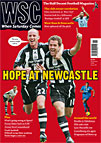 When Nacional lingered one minute too long in the dressing room, the referee called off their match. Chris Bradley reports
When Nacional lingered one minute too long in the dressing room, the referee called off their match. Chris Bradley reports
Players from Nacional, one of Uruguay’s most successful and popular clubs, walked down the tunnel on August 31 knowing they needed a win to stay top of the table. Yet by the time they reached the pitch they found their game against Villa Española had been abandoned. Referee Liber Prudente ruled Nacional had forfeited the match by being one minute late. He subsequently left the stadium with a police escort to avoid fans waiting outside, baying for his blood. The unprecedented conclusion to the match plunged the once tranquil world of Uruguayan football into violence, threats, hearings, appeals and intense debate.
An increasingly violent atmosphere in the crowd of over 12,000 began with threatening chants and ended with rocks thrown, bus windows smashed and two journalists assaulted. In the following days a protest march to the headquarters of the national FA, the Asociación Uruguaya de Fútbol, was met by protective barricades. One fan even instigated legal proceedings for cancellation of a sporting spectacle without the necessary permission of the city council.
The arguments had already begun when the AUF ratified the referee’s decision, awarding a 2-0 victory and three points to Villa Española. They said Prudente had simply followed the letter of the law. Nacional players felt he should have been more flexible, pointing out historic rivals Peñarol had escaped sanction despite arriving even later the previous afternoon. Prudente said he had instructed the fourth official to warn the team, but they left him waiting outside the changing rooms. Nacional coach Gerardo Pelusso said the team left immediately following the warning, but were held up in the tunnel by the mascots. Prudente said it was already past 15.30 when the match officials left the field. Club staff and some media witnesses reported it had been only 15.29. And so on.
With nobody seeming to be quite sure how to interpret the current law, the legal arguments are as tangled as anything involving Carlos Tevez. Yet the question of whether the match should be forfeited or replayed was just for starters. Politicians José Mujica and Eduardo “Lalo” Fernandez asked if any thought had been given to paying fans and, regardless of the regulations, at what point common sense should prevail. While some in government wrung their hands, wiser heads recognised the decision to abandon the match made a mockery of their efforts to control crowds. Amid talk of police inaction, the interior minister and the president of the AUF reportedly clashed, blaming each other for the violence.
Alberto Kesman was one of the injured journalists. He described being chased by between 100 and 150 people, and needed stitches to a head wound after being struck by a stone. “This is my job, but if I didn’t have to commentate I wouldn’t go to the football any more,” he said. The Circle of Uruguayan Sports Journalists warned members not to attend games at Parque Central, Nacional’s home ground in the capital, Montevideo, till their safety could be better guaranteed. They also lodged a complaint with the AUF, which will most likely result in Nacional being docked further points next season.
Club lawyers presented a 30-page appeal on September 8, listing various grounds for the fixture to be replayed. Chief among them was that Prudente lacked the authority to suspend the game and that nowhere in the AUF’s regulations does it say teams can forfeit points for late arrival. Increasing the pressure, several influential members of the club added a warning. They said such was the anger at their treatment that, if the appeal failed, they would seek to disaffiliate Nacional from the AUF. The governing body’s response, originally expected the following week but as yet unannounced, has been slow in coming. Despite the efforts to speed things up, it seems Uruguayan football has finally settled back into its more accustomed pace. The authorities would do well to note that for once nobody is complaining.
From WSC 261 November 2008